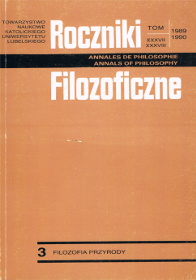Między kosmologią a filozofią
Abstrakt
The two questions : that of the initial singularity and of the temporal origin of the Universe belong to two different spheres of cognition - cosmology and philosophy . They are also examples of the problems which might be called "terminal" . The mutual implications occurring between them may serve as a starting-point for the discussion of mutual relations that seem to occur between cosmology as a natural science and philosophy . But can one practice "philosophy in the context of science" as philosophy of natural science or philosophy of science?
The condition of modern research in general and that of interdisciplinary discussion in particular shows that the answer to the above questions cannot be but positive. As far as discrepancies between the two kinds of knowledge are concerned they are due to either monopolistic aspirations of natural sciences and philosophy or to indiscriminate transfer of arguments and statements, or to neglect of epistemological and methodological differences.
The existing differences, however, do not result in acute isolation, setting rigorous limits or mutual disrespect . The dialogue is possible and desirable as well as coexistence and search for the correlation in the fields of "terminal problems". Philosophy, unless it is to "seal itself up in metaphysics" or cut itself off from numerous directly inaccessible spheres of reality must take advantage of natural sciences. Likewise, if natural sciences are not to fall in to extreme empiricism and refer to unconscious pseudo-philosophie’s they must not only recognize the existence of philosophy not as a purely different and not altogether nonsensical kind of cognition but also realize the existence of philosophical elements in themselves.
Copyright (c) 1990 Roczniki Filozoficzne

Utwór dostępny jest na licencji Creative Commons Uznanie autorstwa – Użycie niekomercyjne – Bez utworów zależnych 4.0 Międzynarodowe.





